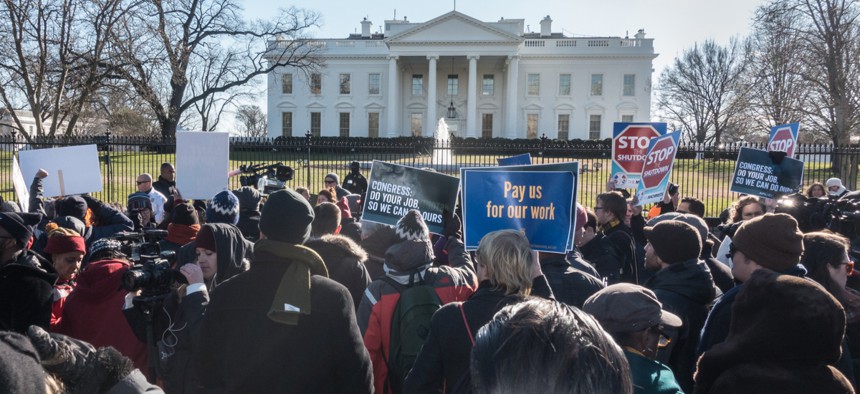Study: Shutdown Did Lasting Damage to Federal Recruitment, Retention and Morale

bakdc/Shutterstock.com
While recovering from the most recent lapse in appropriations, some are fearful there will be another.
Federal retention, recruitment and morale suffered long-term damage from the recent government shutdown, according to a good government nonprofit.
The Partnership for Public Service issued a report on Sept. 20 on how the 35-day shutdown from Dec. 22, 2018, to Jan. 25, 2019—the longest in history—did lasting harm to the government and U.S. citizens. “The full effect of the government shutdown on recruitment, hiring and retention of qualified employees is hard to quantify given the lack of publicly available attrition and employment data from the Office of Personnel Management,” the report said. “But there is deep concern among federal leaders that the lengthy 2018-2019 episode contributed to the perception that the civil service is not valued and that government may not be a reliable employer.”
During the appropriations lapse that resulted from a fight over border wall funding, 380,000 federal employees were furloughed and 420,000 employees were required to work without pay, according to the report.
“Little to no pay raises the past five years, the constant threats to health and retirement benefits, public officials questioning our worth and the constant fear of furloughs have had a cumulative negative impact on recruitment and retention,” Traci DiMartini, Peace Corps chief human capital officer, told the Partnership for the report. She works to help returned volunteers start a career in public service, but said, “Since the rhetoric against federal employees is so toxic, is it any wonder we are having a problem filling key positions?”
The Partnership said the government is already having a hard time recruiting young people and the shutdown only exacerbated that problem. Currently, 6% of all permanent, full-time federal employees are under the age of 30, compared to 21% in the private sector, according to the report. Due to the potential of shutdowns and financial uncertainties, some now consider government jobs, once seen as a source of stability, a liability.
“If we make a habit of [shutdowns], it will be difficult to recruit the next generation of people under 30 because they look at us and think, ‘They don’t know what they’re doing there,’” Kevin Mahoney, chief human capital officer at the Commerce Department, told the Partnership.
The shutdown impacted older and more experienced employees as well, which left a “worrisome risk of a brain drain,” according to the report. At various agencies the Partnership studied employees were motivated to retire following the shutdown due to frustration and sometimes also enjoyment of the time they had off. The Partnership quoted an FBI agent, who said, “This shutdown, in combination with several years in which we have not had basic cost of living increases, has convinced me I need to retire sooner [rather] than later.”
In terms of retention, the Partnership found that some agencies, such as the Peace Corps, that hired employees before the shutdown had a hard time retaining them because they had to wait more than a month before starting their jobs. The Partnership cited a March 2019 Government Accountability Office report that found prolonged shutdowns could harm the government’s retention of employees
Additionally, employee morale suffered during the shutdown. The reported cited a survey by Federal News Network that found 90% of federal employees and contractors believed morale worsened at their agency following the shutdown.
Gwen Yandall, former executive director of human capital policy and programs at the Homeland Security Department, told the Partnership “employees felt like pawns in a chess game.” For example, an internal survey of officials at the Professional Aviation Safety Specialists, a Federal Aviation Administration employee union, found many of their members felt “unappreciated and expendable,” while others had financial and emotional stress.
Human capital officers had many calls and emails during the shutdown from federal employees who were struggling to pay their bills and mortgages. After the shutdown they “were busy figuring out how to most efficiently process back pay, keep morale from faltering even further and process a backlog of job applications,” according to the report.
The report also found concern about the potential for future shutdowns. The Senate passed a stopgap spending measure on Thursday that will keep the agencies open through Nov. 21. The House approved that measure last week and the White House has indicted President Trump will sign it, but even with a funding extension, lawmakers have a number of thorny issues to work out before the new November deadline.
“It’s difficult to work when you have to stop every six months and engage in a shutdown drill,” DiMartini said, noting she is “always fearing September 30.”






